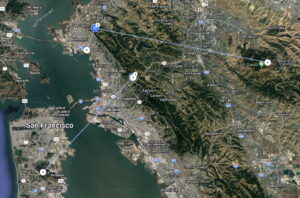Bay Area Backbone: Difference between revisions
No edit summary |
No edit summary |
||
| Line 2: | Line 2: | ||
The Bay Area Backbone Project is building solid, fast, links between major high sites in the Bay Area, which in turn supports a more stable mesh network. Backbone sites are permanent locations, not dependent on amateur radio operators' homes or difficult to access places. |
The Bay Area Backbone Project is building solid, fast, links between major high sites in the Bay Area, which in turn supports a more stable mesh network. Backbone sites are permanent locations, not dependent on amateur radio operators' homes or difficult to access places. |
||
| + | == Status == |
||
The current health of the backbone is monitored [http://kn6plv-backbone.local.mesh/ here] ([https://sfbackbone.xojs.org/ internet]) |
The current health of the backbone is monitored [http://kn6plv-backbone.local.mesh/ here] ([https://sfbackbone.xojs.org/ internet]) |
||
| + | |||
| + | === Management VLANs === |
||
| + | |||
| + | * 3 - [[ORCA]] and [[Fish Ranch]] (need to improve this) |
||
| + | * 121 - [[Mount Diablo]] |
||
| + | * 122 - [[4CCCC|CCCC]] |
||
| + | * 1001 - [[San Carlos]] |
||
| + | * 1002 - [[Black Mountain]] |
||
| + | * 1003 - [[San Pedro]] |
||
== [[Fish Ranch]] / [[ORCA]] == |
== [[Fish Ranch]] / [[ORCA]] == |
||
Revision as of 20:38, 13 September 2022
The Bay Area Backbone Project is building solid, fast, links between major high sites in the Bay Area, which in turn supports a more stable mesh network. Backbone sites are permanent locations, not dependent on amateur radio operators' homes or difficult to access places.
Status
The current health of the backbone is monitored here (internet)
Management VLANs
- 3 - ORCA and Fish Ranch (need to improve this)
- 121 - Mount Diablo
- 122 - CCCC
- 1001 - San Carlos
- 1002 - Black Mountain
- 1003 - San Pedro
Fish Ranch / ORCA
San Bruno Mountain
Status: Equipment installed. Active.
Connection: Non-AREDN, airFiber 5 GHz.
Notes
None
San Bruno Mountain
Fish Ranch / ORCA
Status: Equipment installed. Active.
Connection: airFiber 5 GHz.
Notes
None
Plans
Immediate plans for changes at this site are unclear as the current owners want to do some significant upgrades before adding more equipment. We will probably help out with this project once scheduled (soon). After that the goal is to replace the NSM5 with a more powerful radio, finalize this end of the Fish Ranch link, and look at options for connecting south.
CCCC
Status: Proposed
Connection: AREDN Mikrotik LHG 5
Notes
Evaluating installing a new dish pointing at CCCC during the next site visit.
CCCC
Plans
Re-evaluate the battery system and determine why it fails to provide the constant power required for all the equipment.
Mount Diablo
Status: Equipment installed. Active.
Connection: Non-AREDN, airFiber 3 GHz. Acts as DtD.
Notes
Connects via DtD over non-AREDN radios, so appears as wired AREDN connection, even though it isn't.
Richmond Field Station
Status: Equipment installed, Active.
Connection: Non-Ham, 5 Ghz AC gen2, unknown equipment.
Notes
Connects via DtD over non-AREDN radios, so appears as a wires AREDN connection, even though it isn't.
San Bruno Mountain
Status: Proposed
Mount Diablo
Slides detailing the configuration can be found here and here.
CCCC
Status: Equipment installed. Active.
Connection: Non-AREDN, airFiber 3 GHz.
Note
Connects via DtD over non-AREDN radio.
Richmond Field Station (RFS)
CCCC
Status: Equipment installed, Active.
Connection: Non-AREDN, 5 Ghz AC gen2, unknown equipment.
Notes
Connects via DtD over non-AREDN radio.
Black Mountain
San Bruno Mountain
Status: Evaluating
Without a good intermediate connection down the Peninsula, a link from Black Mountain to San Bruno is our best option.
Mount Allison
Status: Planning
Final stages of planning a Non-AREDN 5 GHz link between Black Mountain and Mount Allison, in coordination with N9JIM.
Mount Allison
Black Mountain
Status: Planning
Notes: A link from Mount Allison to Black Mountain passes directly over one of Hurricane Electric's data centers. They support putting microwave dishes on their roofs.
Needed Sites
East Bay
The most southerly backbone site is in the Oakland Hills. There is a need for a number of high sites stretching down the East Bay to Fremont and Milpitas.
Peninsula
The most southerly backbone site is San Bruno Mountain. There is a need for high sites stretching down though Burlington, Mountain View and Palo Alto.
Notes
DtD connected nodes
The backbone is currently being constructed using Part 15 devices acting as bridges between AREDN nodes. The AREDN nodes connect to bridges via the DtD port / VLAN 2. This essentially puts every node at every location in the Backbone on the same VLAN. Consequently, every broadcast from any node connected directly to any Backbone point will have its traffic retransmitted to every other node. This probably isn't a good thing. The Southern California Mesh solves this problem by having backbones nodes connect to each other using an AREDN tunnel over the "WAN" ... but in their case the "WAN" is in fact a VLAN running over their Part 15 devices. This gives them better control of the traffic on their backbone.
